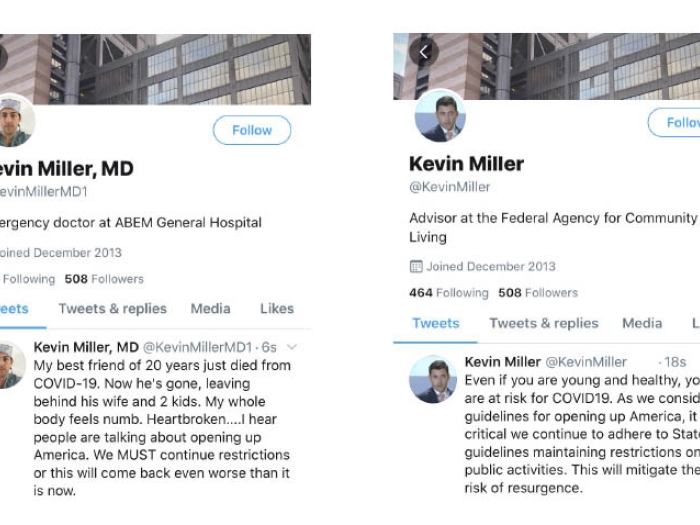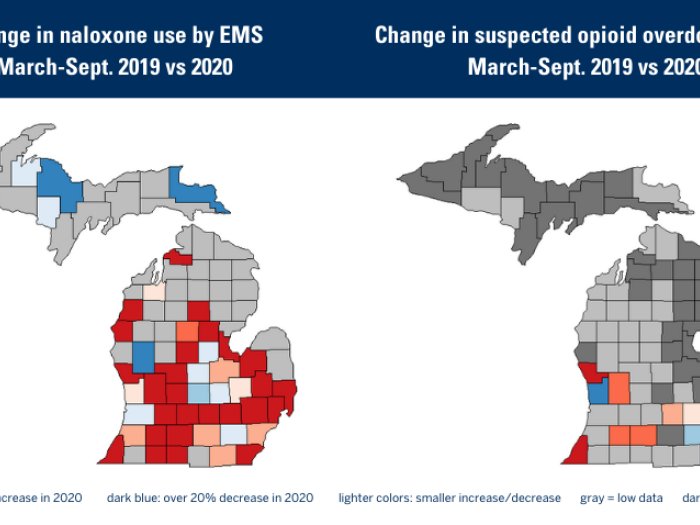A collaborative for emergency departments across the state of Michigan is working to help its colleagues through various aspects of the COVID-19 pandemic.
3:00 PM
Author |

Editor's note: Information on the COVID-19 crisis is constantly changing. For the latest numbers and updates, keep checking the CDC's website. For the most up-to-date information from Michigan Medicine, visit the hospital's Coronavirus (COVID-19) webpage.
Interested in a COVID-19 clinical trial? Health research is critical to ending the COVID-19 pandemic. Our researchers are hard at work to find vaccines and other ways to potentially prevent and treat the disease and need your help. Sign up to be considered for a clinical trial at Michigan Medicine.
No matter its location, emergency departments all share a common goal: help patients in need of immediate, and often, critical care.
"Most emergency departments are a safety net for patients who would otherwise struggle to access health care," says Keith Kocher, M.D., MPH, an associate professor of emergency medicine and learning health sciences at Michigan Medicine and a member of the University of Michigan Institute for Healthcare Policy and Innovation.
"The same can be said for patients needing immediate care during the COVID-19 pandemic."
Kocher serves as program director of the Michigan Emergency Department Improvement Collaborative (MEDIC) — a network of 23 general and children's hospitals across the state of Michigan working together to improve emergency department care. The University of Michigan serves as the coordinating center for the collaborative.
"At our core, MEDIC is a learning collaborative," adds Michele Nypaver, M.D., a professor of emergency medicine and pediatrics at Michigan Medicine, who serves as MEDIC's co-director. "Inherent in our mission is bringing emergency departments together to share frontline experiences and learn from one another."
Nypaver says that's why it made perfect sense for the collaborative to bring its members together around the COVID-19 pandemic to share knowledge and experiences with each other, and answer questions specific to emergency department providers and care teams.
Kocher and Nypaver explain more.
MORE FROM THE LAB: Subscribe to our weekly newsletter
How is MEDIC helping emergency departments across the state of Michigan in their responses to the pandemic?
Nypaver: As the MEDIC Coordinating Center, we decided we should do what we do best and support our emergency department community's response to the COVID-19 pandemic.
We sponsored a series of town hall-style conference calls to convene our colleagues across the state to report on the experiences of their local emergency department and their response.
The town halls' main objectives were to share ideas, learn from what is working and not working, and rapidly disseminate innovations to address the challenges we all face from the pandemic. For example, one town hall specifically focused on conserving personal protective equipment (PPE) while staying safe in the emergency department.
PPE is an issue of concern during the pandemic. What advice is MEDIC giving emergency departments for conserving PPE?
Kocher: We clearly and consistently heard that emergency department leaders across the state are worried about their PPE supplies. However, sites also shared some really amazing local innovations and solutions to help address and mitigate PPE shortages.
Using what we learned in that town hall, we created an infographic: "Conserving PPE in the Emergency Department."
The infographic poses 15 questions for emergency departments to ask themselves as they confront current and future shortages of PPE with the priority of maintaining health care worker safety. These questions fall into three broad strategies:
-
How to reduce the demand for PPE,
-
How to reuse and recycle PPE, and
-
How to increase the supply of PPE.
We hope these questions will spawn additional local solutions and innovations as the health care system continues to confront on-going PPE shortages.
In addition to PPE, what are other topics around the pandemic that MEDIC has provided guidance on to emergency departments?
Nypaver: MEDIC has sponsored town halls on other topics, including special considerations in the care for children and workforce wellness in the emergency department. Our next town hall will focus on key issues in the emergency department treatment of COVID-19 patients, drawing on the experiences from hospitals in southeast Michigan that have been at the forefront of the response to the pandemic. We also anticipate developing future topics, depending on the needs identified by our partners across the state.
Can emergency departments outside of the state of Michigan access this information and guidance?
Kocher: Yes. The MEDIC website has a webpage dedicated to our response to the COVID-19 pandemic. We will house all of our educational materials there and they are freely available for download.
How does MEDIC plan to help with the pandemic response in the future?
Kocher: We are currently exploring ways in which the data that MEDIC collects in its quality improvement clinical registry can be used to understand changes in the way emergency departments across the state delivered care during the pandemic.
MEDIC is sponsored by Blue Cross Blue Shield of Michigan and Blue Care Network through the Value Partnerships program. To learn more about MEDIC, please visit its website.
Like Podcasts? Add the Michigan Medicine News Break to your Alexa-enabled device or subscribe for updates on iTunes, Google Play and Stitcher.

Explore a variety of health care news & stories by visiting the Health Lab home page for more articles.

Department of Communication at Michigan Medicine
Want top health & research news weekly? Sign up for Health Lab’s newsletters today!





